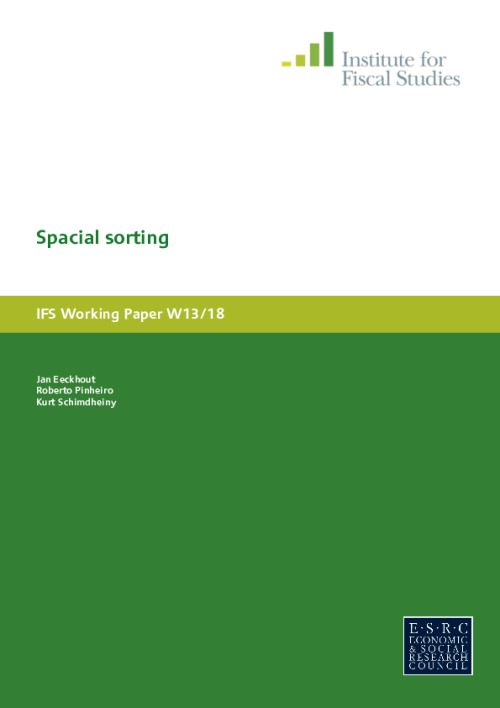Downloads

wp201318.pdf
PDF | 2.56 MB
We investigate the role of complementarities in production and skill mobility across cities. We propose a general equilibrium model of location choice by heterogeneously skilled workers, and consider different degrees of complementarities between the skills of workers. The nature of the complementarities determines the equilibrium skill distribution across cities. We prove that with extreme-skill complementarity, the skill distribution has fatter tails in large cities; with top-skill complementarity, there is first-order stochastic dominance. Using the model to back out skills from wage and housing price data, we find robust evidence of fat tails in large cities. Big cities have big inequality. This pattern of spatial sorting is consistent with extreme-skill complementarity: the productivity of high skilled workers and of the providers of low skilled services is mutually enhanced.
Authors

Research Associate Pompeu Fabra University and Barcelona Graduate School of Economics
Jan is an IFS Research Associate, a Research Professor at the Barcelona School of Economics and an ICREA Research Professor at the UPF Barcelona.

Roberto Pinheiro

Kurt Schmidheiny
Working Paper details
- DOI
- 10.1920/wp.ifs.2013.1318
- Publisher
- Institute for Fiscal Studies
Suggested citation
J, Eeckhout and R, Pinheiro and K, Schmidheiny. (2013). Spatial sorting. London: Institute for Fiscal Studies. Available at: https://ifs.org.uk/publications/spatial-sorting (accessed: 3 May 2024).
More from IFS
Understand this issue

Where next for the state pension?
13 December 2023

Social mobility and wealth
12 December 2023

Autumn Statement 2023: IFS analysis
23 November 2023
Policy analysis

Recent trends in and the outlook for health-related benefits
19 April 2024

Progression of nurses within the NHS
12 April 2024

Regional variation in earnings and the retention of NHS staff in Agenda for Change bands 1 to 4
10 April 2024
Academic research

A senior doctor like me: Gender match and occupational choice
24 April 2024

Police infrastructure, police performance, and crime: Evidence from austerity cuts
24 April 2024

Imagine your life at 25: Gender conformity and later-life outcomes
24 April 2024